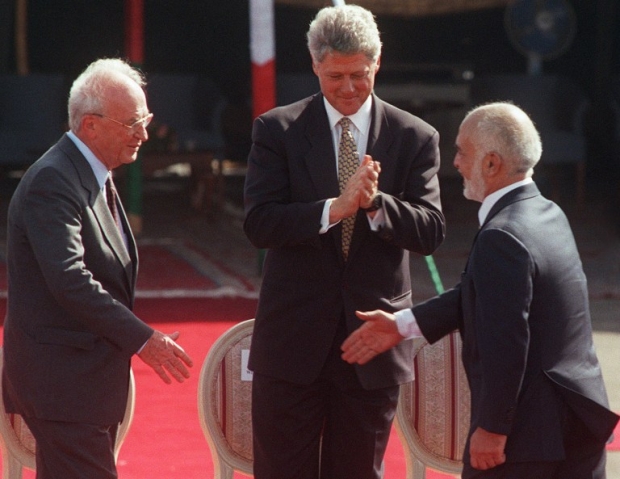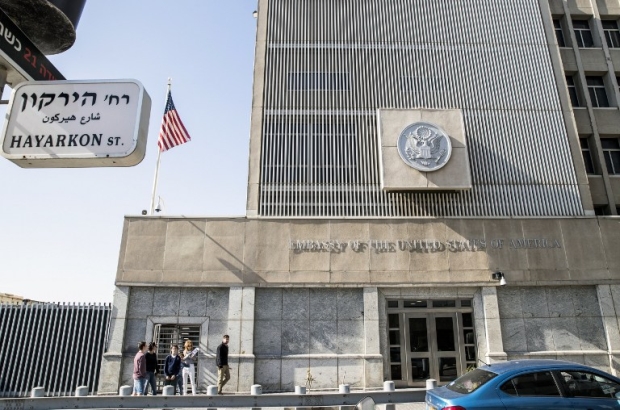Jordan's worst nightmare could be yet to come if US embassy moves to Jerusalem

For decades, the Jordanian role in the occupied city of Jerusalem has been exceptional and rather sensitive case.
For this reason, Trump’s repeated vows to move the US embassy from Tel Aviv to Jerusalem has disproportionately upset the Jordanian government which, at the moment, has no shortage of crises.
Moving the embassy would breach the 1994 Jordanian-Israeli peace agreement and render final status negotiations into absurdity
It’s this nervousness that explains King Abdullah II’s rushed visit to Washington only a few days after Trump’s arrival at the White House, the first Arab leader to meet the new president reportedly coming without invitation or prior arrangement.
Jordan's role in Jerusalem
Key to understanding Jordan’s anxiety is the Jordanian-Israeli peace treaty - sometimes called the Wadi Araba Treaty because of where it was signed – signed in October 1994 which stated that Israel would respect the special role that Jordan had historically played in Jerusalem’s holy places and, further, would give priority to the kingdom’s role during final status negotiations.
READ: Jordan held elections. It changed very little.
In other words, with the treaty, Israel formally recognised Jordan’s role, something it hadn’t been able to deny or ignore for decades. Israel also agreed at the time to refrain from changing – either geographically or demographically - the status of the holy city before reaching at a final agreement to which Jordan was a party.
And even after Israel’s occupation of Jerusalem in 1967, Jordan maintained the right to oversee the city’s holy Islamic and Christian places. To this very day, the Jordanian Ministry of Awqaf (Endowments) continues to provide custodianship and services at Al-Aqsa Mosque and other religious places in Jerusalem.
The rush to DC
In light of this history, Jordan is the most anxious party in the region as a result of Trump’s pledges with regard to move the US embassy, a measure which would imply US acknowledgment that Jerusalem is the capital of Israel.
The king’s rushed visit to Washington DC came without consultation or reference to major Arab forces
The king’s rushed visit to Washington DC notably came without consultation or reference to major Arab bodies like the Arab League or the Arab group at the United Nations, underlining the incapacity of a united Arab front to stand up to Trump. That incapacity was clear in the aftermath of Trump’s executive order to ban citizens of six Arab states from the US.
READ: Jordanian king warns Trump about moving US embassy to Jerusalem
Importantly, the unplanned visit also makes it clear that Jordan takes the US promises seriously and believes that America will actually move the embassy to Jerusalem, a step that would constitute the biggest transformation in the American stance in years – and one with major ramifications.
Ultimately, it would leave Jordan with one of two choices, each more bitter than the other: either enter into a two-headed crisis with Washington and Tel Aviv at the same time or silently lose its role in Jerusalem.
Imagining collapse
Clearly, some of the anxiety stems from decision-making circles in Jordan that believe an embassy move would lead to a security collapse inside the Palestinian territories.
Jordan is keen to avoid more chaos especially because a large proportion of Jordanian citizens have Palestinian roots
After all, the Al-Aqsa intifada in 2000 erupted and raged on for several years because of the holy city. The uprising saw the collapse of the Oslo agreement with the termination of the geographical designation of the West Bank territories into A, B and C as well as the unilateral decision to withdraw Israeli troops from the Gaza Strip without negotiations.
The extreme tension and rage within the Palestinian territories right now suggests that such a move could indeed lead to the eruption yet another intifada, one which could lead to a major strategic change in the Palestinian-Israeli conflict, including the total collapse of the Palestinian Authority with all the repercussions that might entail.
A new Palestinian uprising – especially one which causes the PA’s collapse - would have a direct impact on Jordan’s security and it is this security collapse that is driving the kingdom, more than any other party, to anxiety. If the PA falls apart, it would become rather difficult, going forward, to find anyone willing to negotiate in the name of the Palestinian people.
Above all, moving the embassy would breach the Jordanian-Israeli agreement that was signed thanks to US mediation and sponsorship. It would render final status negotiations into absurdity because the most important issue – Jerusalem - would have been settled as a fait accompli by the Israelis and the Americans.
Mohammad Ayesh is an Arab journalist currently based in London.The views expressed in this article belong to the author and do not necessarily reflect the editorial policy of Middle East Eye.
The views expressed in this article belong to the author and do not necessarily reflect the editorial policy of Middle East Eye.
Photo: King Abdullah II and Donald Trump meet in Washington on 2 February 2017 (Jordanian Royal Palace/AFP)
This article is available in French on Middle East Eye French edition.
Stay informed with MEE's newsletters
Sign up to get the latest alerts, insights and analysis, starting with Turkey Unpacked
Middle East Eye delivers independent and unrivalled coverage and analysis of the Middle East, North Africa and beyond. To learn more about republishing this content and the associated fees, please fill out this form. More about MEE can be found here.









